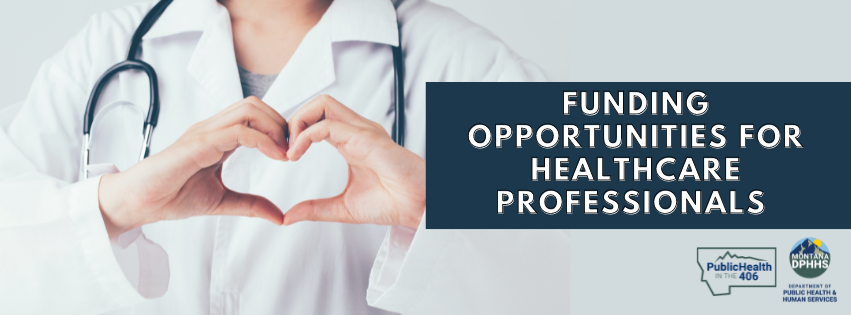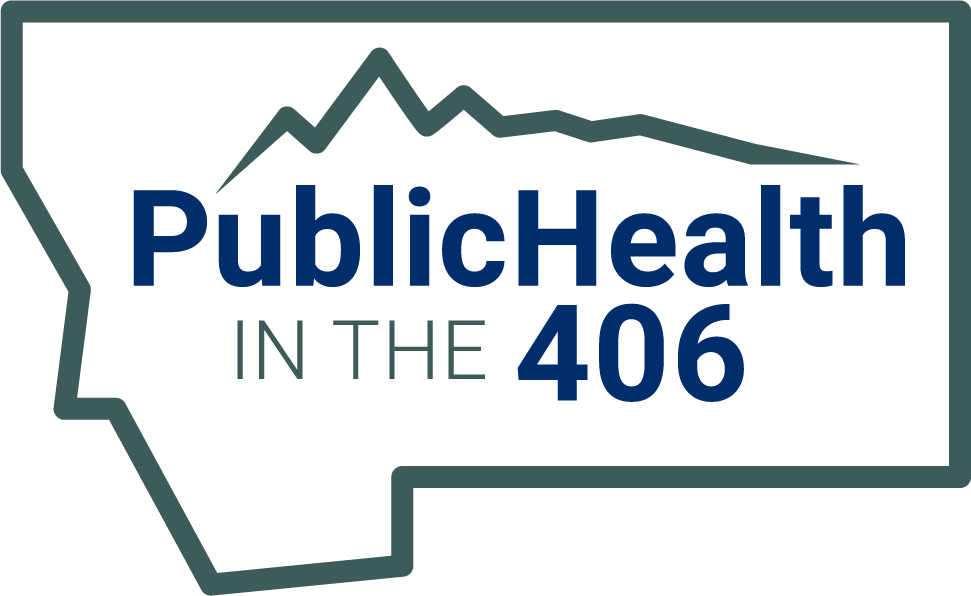Funding Opportunities and Program Resources
Join us in a funded project and improve patient care, clinical outcomes, and staff knowledge. DPHHS has a wide variety of available grant opportunities for health improvement that fit any clinic or hospital work schedule. Interested in more than one? We can work with health systems to create an outline of activities to align grants and receive additional funding. See our available openings below. If you would like assistance applying to grants or would like to further discuss the scope of the grants, please email Callan Brick.
Get the PDF of our full funding opportunities list for easy reference and sharing.
Funding Opportunities
If you wish to apply to any of the asthma funding opportunities, please complete a brief application online at dphhs.mt.gov/publichealth/asthma/qualityimprovement or reach out to asthmainfo@mt.gov and we will send you an application.
| Funding Opportunity | Timeframe | Brief Description | Funding Amount | Who is Eligible? |
| Asthma Quality Improvement Projects | 12-month period, starting when you are awarded. There is no set start date for Asthma QI projects. | Improve care of patients with Asthma through a quality improvement project to deliver evidence-based healthcare. Many avenues to choose from to improve Asthma care for your population! | $5,000, but up to $7,000 if the site wishes to include tobacco QI work. | Health care clinics/systems, Tribal Health, Community Health Centers, School-Based Health Centers, or any other healthcare facility working with people who have asthma. |
If you wish to apply to any of the cardiovascular funding opportunities, please reach out to CardiovascularInfo@mt.gov and we will send you an application.
| Funding Opportunity | Timeframe | Brief Description | Funding Amount | Who is Eligible? |
| Access to Care | 18-Months | Increase screening for health-related social needs and build partnerships to address health disparities. With a focus on patients who have diabetes, hypertension, and high cholesterol. | $5,000 per site | Health care clinics/systems, or any other healthcare facility working with populations with diabetes, hypertension and high cholesterol. |
| Community-Based Organization Project | 12-Months | Community-Based Organizations partner with a healthcare organization (using CONNECT to receive referrals) to improve non-medical factors like food insecurity, housing instability, etc. that influence overall health. Funds cannot be used to purchase food, cars, or equipment under the grant funding. | $5,000 per site | Community-based organizations where a partnering clinic is located that have means to address housing, food insecurity, transportation insecurity, and more. Must include high-priority census areas. |
| Blood Pressure Cuff Loaner Program | 12-Months | Implement blood pressure (BP) cuff loaner programs for patients/participants with uncontrolled hypertension. | Up to $5,000 depending on number of project participants. Recipients receive nine blood pressure cuffs along with additional educational materials for patients. | Montana community pharmacies, Tribal Health and CHCs in selected regions. Applicants should not have previously received a DPHHS Loaner Program sub-award. |
| Food Farmacy Project | 12-Months | Support food insecure patients to access food resources. Using a team-based care approach, a clinic will partner with a local food pantry to improve access to healthier food for patients with high blood pressure and/or high cholesterol. Funds cannot be used to directly purchase food. | $5,000 per site | Tribal Health, Community Health Centers (CHCs), and food pantries in selected areas. |
| Health Coaches for Hypertension Control Timeframe- Indefinitely once coach is trained, grant cycles run for 12-month cycles and each coach is awarded up to $5,000 per grant cycle for completing 2 sets of classes. Coaches may continue classes without additional training across grant years if they are interested. | 12-Months | Health Lifestyle program offered by lay leaders to their community focusing on reduction in hypertension and high cholesterol. The classes are eight-weeks long and DPHHS providers training, supplies, and technical assistance to trained coaches to complete these classes. | Up to $5,000 plus a limited amount of educational materials for participants such as a DASH cookbook, blood pressure cuff, resistance bands, and more. | Any person who is working with a population with hypertension and high cholesterol. Often, people who already have some background in teaching lifestyle classes such as tobacco cessation, National Diabetes Prevention Program Coaches, etc. No formal healthcare experience required. |
| Community Health Worker (CHW) Social Need Project | 12-month | Conducting a health-related social needs screener with community members, referring to community programs to address social needs, and tracking usage of services. | $5,000 per site | Organizations that employ CHWs and cover patients or residents in high-priority census areas. |
| WISEWOMAN Program |
Dependent upon the model used in the region. | Conducting cardiovascular risk assessments and addressing SDOH for women aged 35-64, low-income (< 250% Federal Poverty Level), uninsured or under- insured ($250+ deductible). This includes tracking referrals, WISEWOMAN participants’ participation in the referred services/programs, and whether they completed the programs. Includes referrals to Healthy Behavior Support Services | Dependent upon number of participating clinics | Health care clinics/systems, community-based organizations or any other healthcare facility working with populations with hypertension and high cholesterol in high-priority regions. |
If you wish to apply to any of the diabetes funding opportunities, please reach out to diabetes@mt.gov and we will send you an application.
| Funding Opportunity | Timeframe | Brief Description | Funding Amount | Who is Eligible? |
| DSMES-Accreditation Recognition | 12 Month | Provide funding opportunities to any current DSMES sites or new sites wanting to delivery DSMES to be ADA-recognized/ADCES accredited by providing technical assistance and support to achieve recognition/accreditation. This includes becoming an independent site or a site under the MT DEAP Umbrella. | $3,000 per site | For new or current programs DSMES to work on achieving ADA recognition/ADCES-accreditation. |
| Chronic Kidney Disease (CKD) QI Project | 12-Month | Provide funding opportunities for healthcare professionals to work on a quality improvement project to increase access and improve screening for the early detection of diabetes retinopathy (DR). | $5000 per site | Healthcare clinics, hospitals or any other healthcare facility working with people who have diabetes. |
| Diabetes Retinopathy QI Project | 12-Month | Provide funding opportunities for healthcare professionals to work on a quality improvement project to increase access and improve screening for the early detection of diabetes retinopathy (DR). | $5,000 per site and the possibility of a retinopathy camera if needed. | Health care clinics, hospitals or any other healthcare facility working with people who have diabetes. |
| Family Healthy Weight Program Implementation | 12-Month | Identify specific sites who are interested in implementing a Family Health Weight Program within their system using a family centered approach to reduce health related risk for type 2 diabetes. | $5,000 per site | Health care clinics, hospitals or any other healthcare facility working with people who have diabetes. |
| Diabetes Support Program Implementation | 12-Month | To identify sites who are interested in implementing a complementary diabetes support program to increase access to diabetes education services for their patients. | $5,000 per site | Health care clinics/systems, community-based organizations or any other healthcare facility working with people who have diabetes. |
| Diabetes Support Program- Walk With Ease Project | 12-Month | Increase access to and participation in complementary diabetes support programs for their patients with or at risk for developing diabetes utilizing the Walk with Ease program. | $5,000 per site | Health care clinics, hospitals or any other healthcare facility working with people who have diabetes |
| Access to Care Project | 18-Month | Increase screening for health-related social needs and build partnerships to address health disparities. With a focus on patients who have diabetes, hypertension, and high cholesterol. | $5,000 per site | Health care clinics/systems, or any other healthcare facility working with populations with diabetes, hypertension and high cholesterol. |
If you wish to apply to any of the funding opportunities related to social determinants of health, please reach out to Margaret.Mullins@mt.gov and we will send you an application.
All programs include regular technical assistance and possible patient/ staff materials for use.
| Funding Opportunity | Timeframe | Brief Description | Funding Amount | Who is Eligible? |
| Health-related social need Training | 6-Months | Improve the capacity of the diabetes, cardiovascular, or asthma workforce to address factors related to health-related social needs that impact outcomes for priority populations with and at risk for chronic disease. | For Diabetes workforce per site: $500 (3-10) $750 (10-50) $1000 (>50) |
Health care clinics, hospitals or any other healthcare facility working with people who have asthma, diabetes or at risk for diabetes, or hypertension. Please specify on your application. |
Program Resources
Community Based Programs
Public health enhances quality of life in Montana by supporting healthy living in your community. It touches everyone in Montana – from birth to death. Take a closer look at what public health programs are available in your community to make your life better and See Public Health Differently.
The Heart of Healthy Communities Toolkit was created to help Montanans improve heart health and strengthen community connections. It offers a variety of low-barrier resources that can be used by any community to highlight and use their assets to build a healthier future.
The 2024 Community Health Program Guide highlights programs that address the prevention and management of chronic disease and preventable health issues ex perienced by Montanans, including people with disability who experience additional health concerns, such as pain and depression. These programs offer access to health promotion and healthy lifestyle opportunities.
The Community Programs Map and related resources offer a wide range of health-focused programs available in your community, aimed at preventing disease, promoting wellness, and supporting individuals with chronic conditions or other health challenges.




